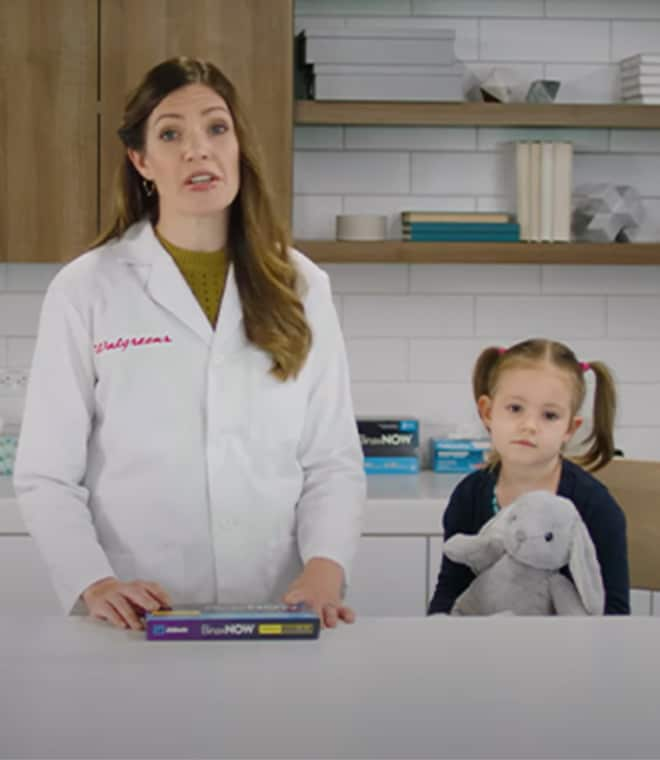Health
COVID-19 vaccines for kids: Q&A
By Walgreens Nov 07, 2025 • 4 min
Some children may be able to get vaccinated against COVID-19, if they are eligible. Children who have certain health conditions may be at risk for severe COVID-19, which may be prevented with vaccination. Your child’s healthcare provider can help determine if a COVID-19 vaccine is right for your child. Parents may also have questions about the safety and efficacy associated with pediatric COVID-19 vaccines, specifically short- and long-term side effects. Our clinical experts answered frequently asked questions by parents and guardians to help address your concerns.
Q: The vaccine is still relatively new—has it been tested enough to be safe for my family?
A: The technology used to develop these vaccines has been decades in the making, rigorously tested and proven effective. The CDC monitors the safety of all COVID-19 vaccines (and all other vaccines) after they are authorized and approved for use. This includes monitoring the risk of potential adverse events after vaccination— including myocarditis and pericarditis in children.
Q: Will the pediatric COVID-19 vaccine impact my child’s future fertility or cause permanent genetic shifts?
A: There are no studies that show either compromised fertility or permanent genetic shifts associated with the COVID-19 vaccine. DNA is stored inside the center of our cells, called the nucleus. The mRNA from the vaccine stays outside the nucleus and doesn’t interact with our DNA. After the immune system gets the mRNA instructions, it breaks them down and gets rid of them quickly.
Q: Should I be concerned about research suggesting the rare possibility that young men and boys will develop myocarditis or pericarditis?
A: Myocarditis (inflammation of the heart muscle) and pericarditis (inflammation of the outer lining of the heart) are rare among children but just like any symptoms that may be experienced after getting a vaccine or taking a medication-- you should report these to your healthcare provider. They can determine if any side effects are serious and offer possible medications to help with mild symptoms.
Some children with certain health conditions may be more likely to get very sick from COVID-19. That’s why it’s important for you and your child’s healthcare provider to talk together and decide what’s best, through shared clinical decision making. Your child’s healthcare provider can look at your child’s medical history and help determine if the COVID-19 vaccine is appropriate for them.
Q: Will my child have to miss school or sporting and social events due to potential side effects from the vaccine?
A: Most reported side effects are on the milder side among children receiving the vaccine, and severe reactions are unusual. Pain and redness at the injection site, tiredness, muscle aches, headache, and other mild side effects usually lessen or go away within a few days.
Q: I had side effects after getting vaccinated. Will my child experience the same?
A: The COVID-19 vaccine dose given to children is smaller than the dose given to adults and teens. Reported common side effects have been temporary and mild, which can be similar to side effects that children may experience when getting other vaccines.
To schedule your child's COVID-19 vaccine, visit Walgreens.com/ScheduleVaccine. Ask your pediatrician if you have additional concerns about whether the COVID-19 vaccine is right for your child.
Clinically reviewed October 2025.
Sources:
- https://publications.aap.org/pediatrics/article/156/3/e2025072788/202525/Hospitalization-for-COVID-19-and-Risk-Factors-for
- https://www.niaid.nih.gov/diseases-conditions/decades-making-mrna-covid-19-vaccines
- https://www.cdc.gov/vaccine-safety-systems/about/monitoring.html
- https://www.mayoclinic.org/diseases-conditions/coronavirus/in-depth/coronavirus-myths/art-20485720
- https://www.fda.gov/vaccines-blood-biologics/safety-availability-biologics/fda-approves-required-updated-warning-labeling-mrna-covid-19-vaccines-regarding-myocarditis-and
- https://www.healthychildren.org/English/health-issues/conditions/COVID-19/Pages/The-Science-Behind-the-COVID-19-Vaccine-Parent-FAQs.aspx
- https://www.lung.org/lung-health-diseases/lung-disease-lookup/covid-19/prevention/kids-covid-19
- https://www.aap.org/en/patient-care/covid-19/covid-19-vaccine-frequently-asked-questions/?srsltid=AfmBOorhOrktE9TUB7XErCluduI7oCwt86OTMqGGujmaWdL0-nNaWkMo
- https://labeling.pfizer.com/ShowLabeling.aspx?id=16351
- https://static.modernatx.com/pm/6cef78f8-8dad-4fc9-83d5-d2fbb7cff867/5efa7d9d-05e8-46b5-945a-637c2867bd00/5efa7d9d-05e8-46b5-945a-637c2867bd00_viewable_rendition__v.pdf
- https://www.vaccineshoppe.com/assets/pdf/vsh/pi/NuvaxovidPI.pdf
- https://www.cdc.gov/media/releases/2025/cdc-immunization-schedule-adopts-individual-based-decision.html
